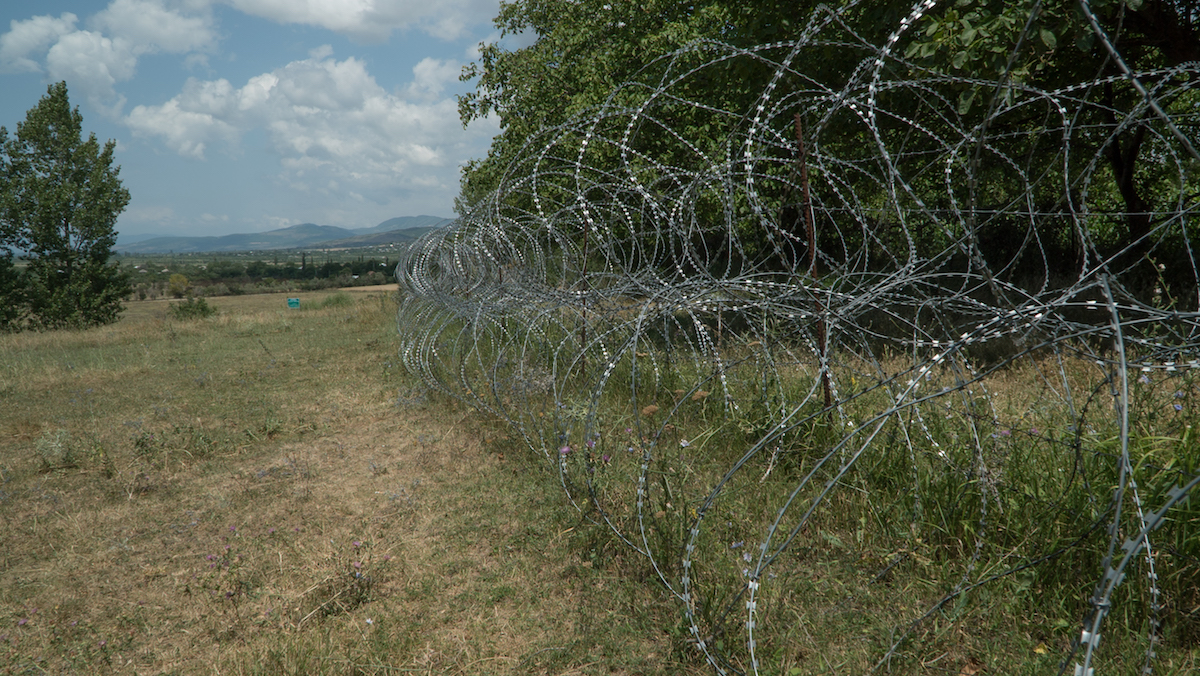Life behind the barbed wire along Georgia's line of demarcation
“And here the bus running between Gori and Tskhinvali has arrived,” says 78-year-old Vitali Kasradze, standing on the road leading from the Georgian city of Gori to Tskhinvali – the capital of South Ossetia that is occupied by Russia. We are 200 meters away from the line of demarcation in the Georgian village of Ergneti, which borders Tskhinvali. It would appear that the bus is going straight for the checkpoint, beyond which lies South Ossetia. But still, it stops.
Further on, one can see a road laden with green signs, though there’s no way through.
“Sorry, it’s the bus from Gori to Ergneti. No one goes to Tskhinvali and they don’t let anybody in,” Vitali Kasradze, an Ossetian Georgian from Ergneti, corrects himself.
The Russian cameras are watching us
He lived for dozens of years in Tskhinvali. His sister still lives there – she married an Ossetian. Since the Russian-Georgian war in August of 2008, he hasn’t seen her even once. Along the line of demarcation between unrecognized South Ossetia and the rest of Georgia, there are hundreds of these stories: civilians living on the Georgian side aren’t allowed into Tskhinvali – neither to see relatives nor to visit their parents’ graves.
After the 2008 war, control of the line of demarcation fell into the hands of the Russian FSB. And they set up harsh rules, practically severing all contact between Georgians and South Ossetians.
Residents of South Ossetia can enter Georgia only from Russia itself now. They go through the Northern Caucasus and cross over through the direct border of Russia and Georgia – they enter Georgia with Russian passports. Besides those, they also have South Ossetian passports, which are given out by the de-facto authorities of the unrecognized republic.
Instead of fences, one can observe barbed wire around the line of demarcation. The majority of the checkpoints in the villages along this line are closed – neither people nor transport are able to cross over.
The only people who are able to cross what the Ossetians call the ‘State Border” and what Georgians and the international community call the ‘line of demarcation’, are residents of the Ossetian town of Akhalgori (in Ossetian, Leningori). For this, they need to receive special permission.
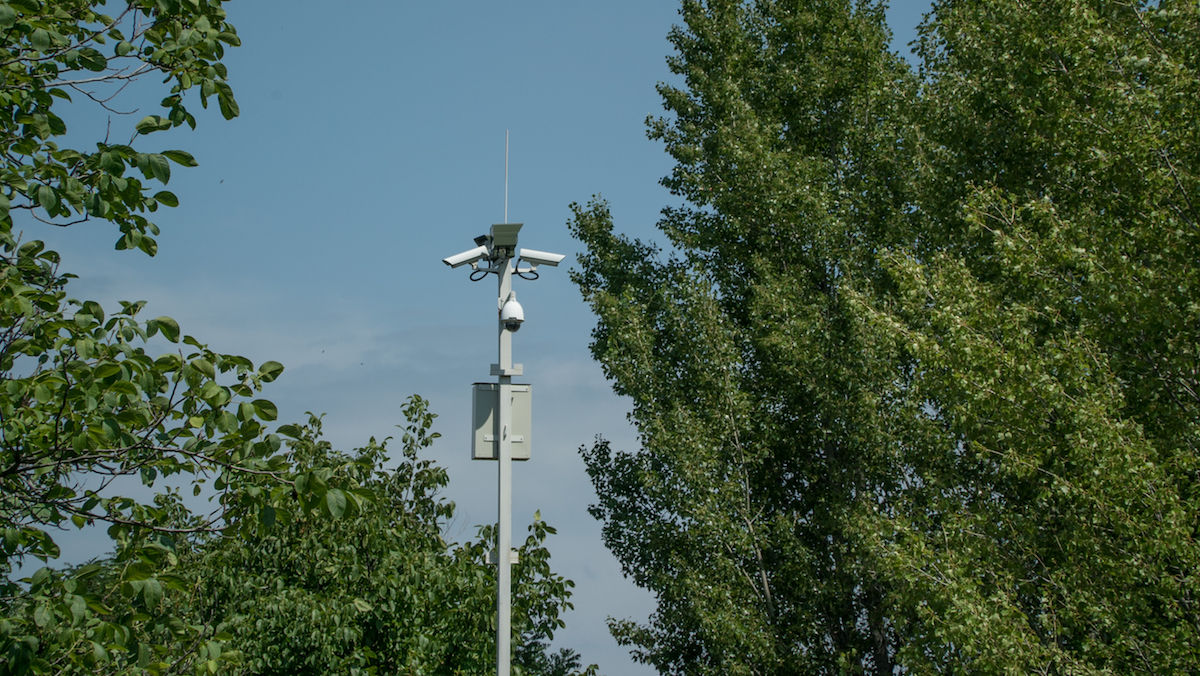
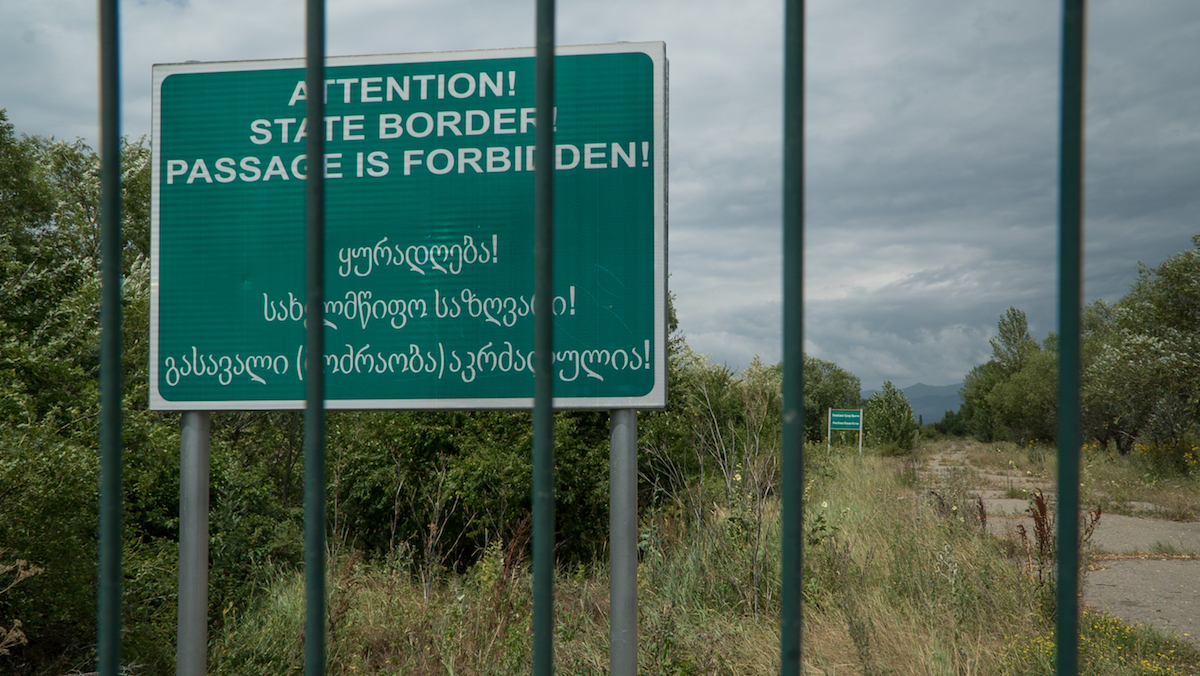 “At first, this line was guarded by Ossetians. Now, there are only Russians there. There’s not a single Ossetian. They sometimes greet us from the other side of the fence,” he says as he rushes after his two cows whom he has let out to pasture near the barbed wire.
“At first, this line was guarded by Ossetians. Now, there are only Russians there. There’s not a single Ossetian. They sometimes greet us from the other side of the fence,” he says as he rushes after his two cows whom he has let out to pasture near the barbed wire.
Kasradze has rebuilt his burnt house: four years after the war, he lived either in Tbilisi or in Kaspi, in a home where an Ossetian family had formerly resided.
This was not unusual. Georgians found Ossetians who had been forced to leave their homes in Georgian villages and cities – they made deals with them, traded homes in the period while they would build their own. The Ossetian family did not deny Vitali Kasradze his request.
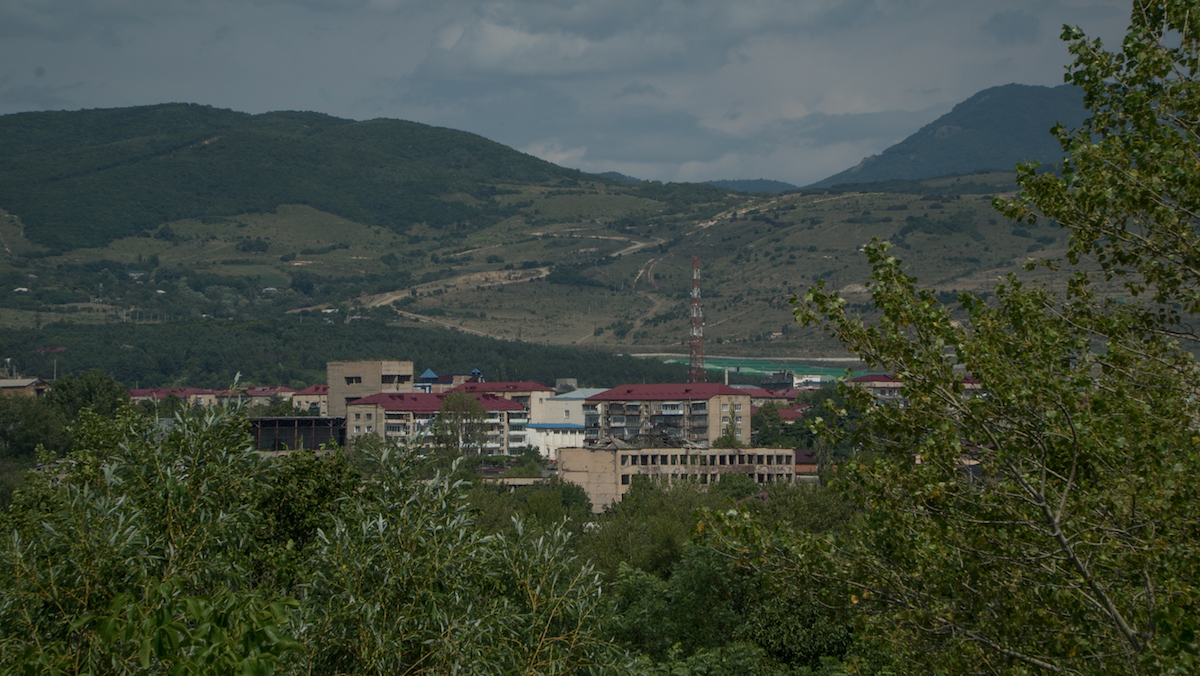
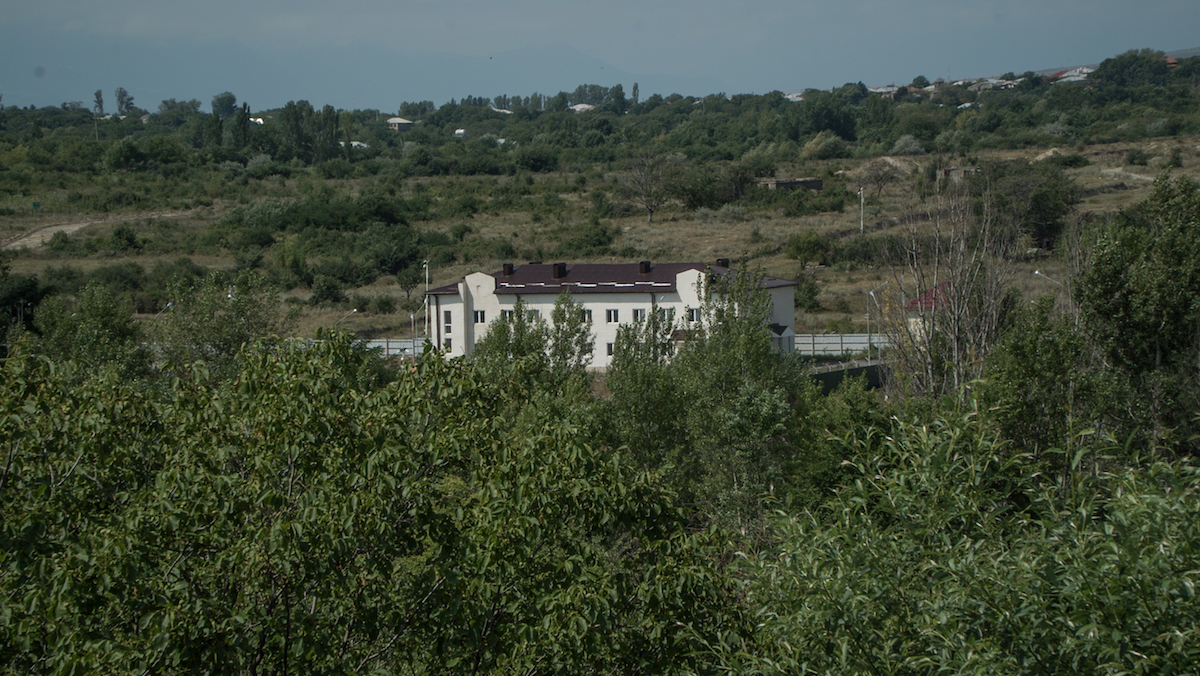
According to the Medvedev-Sarkozy plan, which was meant to resolve and regulate the Russian-Georgian conflict of 2008, the Russians were supposed to withdraw their troops up to the line and borders that had been in force before the war. Today, their divisions control not only the line of demarcation from the 2008 war, but all of South Ossetia. Georgians were supposed to withdraw their troops as well, and now the line of demarcation is patrolled only by Georgian police officers.
How’d you get over there? Come back!
Tskhinvali begins right behind Ergneti. The last homes of the settlement are divided from Tskhinvali by the Liakhvi river and a small river as well.
“Russian border guards sometimes sit right here in these bushes,” points out Liya Chilachidze towards a spot on the other side of the river.
She also lives in Ergneti. Now she is head of a division within the ruling ‘Georgian Dream’ party in the local self-governing ‘sakrebulo’.
She says she was forced to start her life over three times already. The first time was in 1991 during the heat of the Georgian-Ossetian conflict, which killed her husband. She was forced to leave Tshkinvali then. The second time was in 2008, when her house in Ergneti was burnt down during the war and she had to search for temporary lodgings. The third time was when she went to rebuild her house in Ergneti.
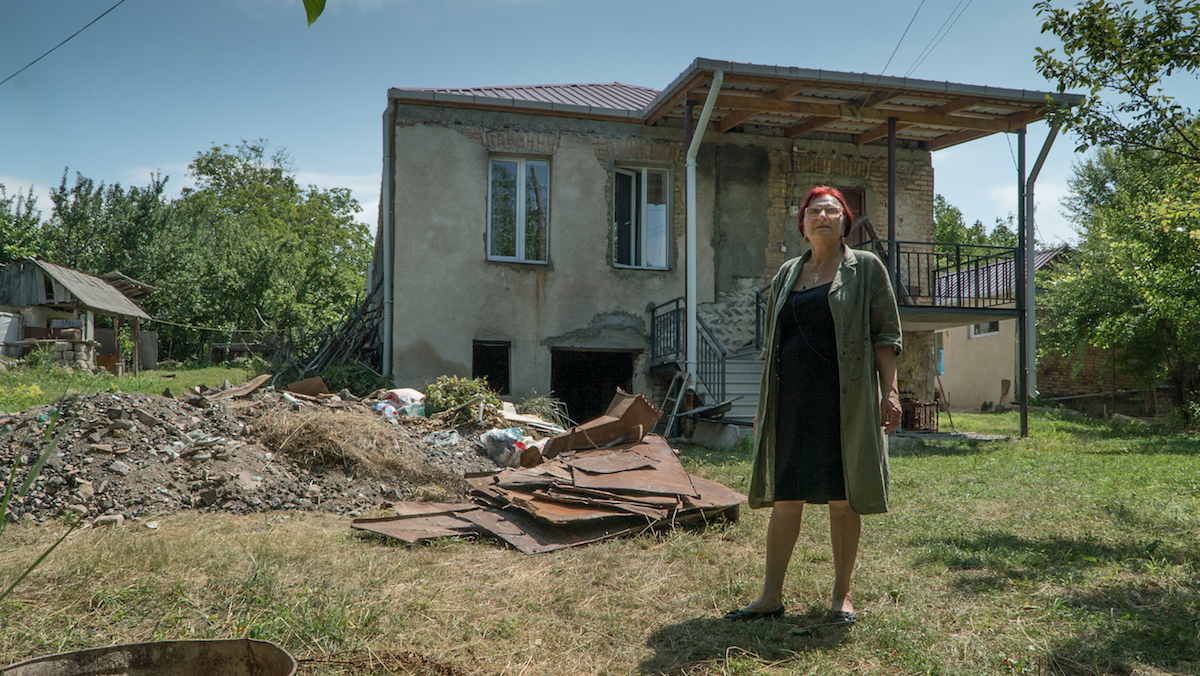
After the death of her husband she had to raise her three children. In order to pay for their education, she opened a mini-hotel in her house for those arriving at the Ergneti market. Until 2004, it was the center of commerce and communication between Georgians and Ossetians.
“The entire Caucasus came here,” remembers Liya. She mostly had Ossetian visitors. “This market brought people together. The government didn’t play any role in this. And then Saakashvili closed down the market through his adventurous schemes,” she says.
Georgian songs at Ossetian weddings and the explosion of artillery and from tanks on the Russian side are the sounds that fly down from Tskhinvali into Lia Chiladchidze’s courtyard.
“They [the Ossetians] sing Georgian songs at weddings and dance to Georgian music. And then they say that they don’t want to even see Georgians. One of my friends recently called me – she works in Tbilisi. She heard the music through the telephone and asked me, ‘A wedding?’ I answered, ‘Yes, yes, a wedding. I’m in Tskhinvali’. She almost fainted. ‘How did you get there? Come back!’”
Lia Chilachidze can hear songs sung at Ossetian weddings, but she can’t call her friends in Tshkinvali. She is able to talk with them only with the help of social media.
“There they have a Russian mobile operator. I don’t want them to have some problems because of me. I don’t want them to feel pressured because they talk with us,” she explains.
The July sun is at its zenith over Tshkinvali. With a slow look, Lia Chilachidze glances over the inaccessible, native but simultaneously foreign city that used to be her home. She can describe every home there. From the side, over the barbed wire, the Russians observe us. Their cameras attached to a high stake or tower.
These cameras help the Russians ‘catch’ and detain people who illegally cross from one side to the other. After which they take them to the Tskhinvali investigative detention center. Locals say that Ossetians are held there for two days.
But the consequences for Georgians that cross over are rather different. In order to be freed, the Georgian authorities must get involved, as does the International Committee of the Red Cross (ICRC) and monitoring missions of the EU. And sometimes that works out.
Other times it ends in sentences, as happened with 30-year-old Georgi Giunashvili. He crossed over to the South Ossetian side, as his relatives claim, in order to look at their abandoned house in South Ossetia. There he was seized, accused of belonging to an illegal arms group and sentenced to 20 years in prison. The KGB of South Ossetia claims that Giunashvili was participating in a self-defense mission of the village of Dise in Tskhinvali region. The Georgian authorities say in turn that these accusations are ridiculous.
The Russian-Ossetian side allows Georgi’s mother to visit him. His relatives say that he is in a very bad condition. But they refused to tell us more than that. They are afraid that he may be harmed for their words.
Occupied
Now, in the basement of her newly-restored home, Lia Chilachizde is creating a museum from the 2008 war.
“It will be proof of what we lived through. People must see what happened here. Many of those that live far away, for example, in Tbilisi, don’t really know what we lived through. We have to get down all the facts, but this won’t be a ‘museum of aggression’. Sometime, maybe in 10-20 years, all of these walls will fall down. All of these lines are but temporary. Do you think they don’t understand this in Tskhinvali?”
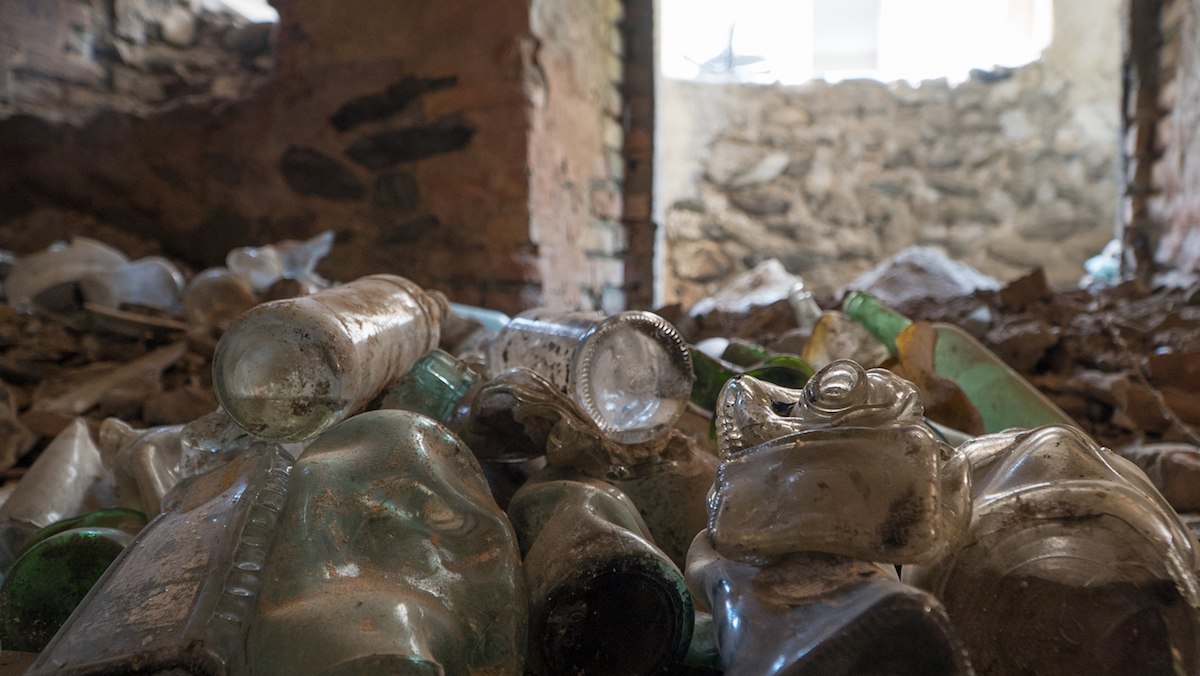
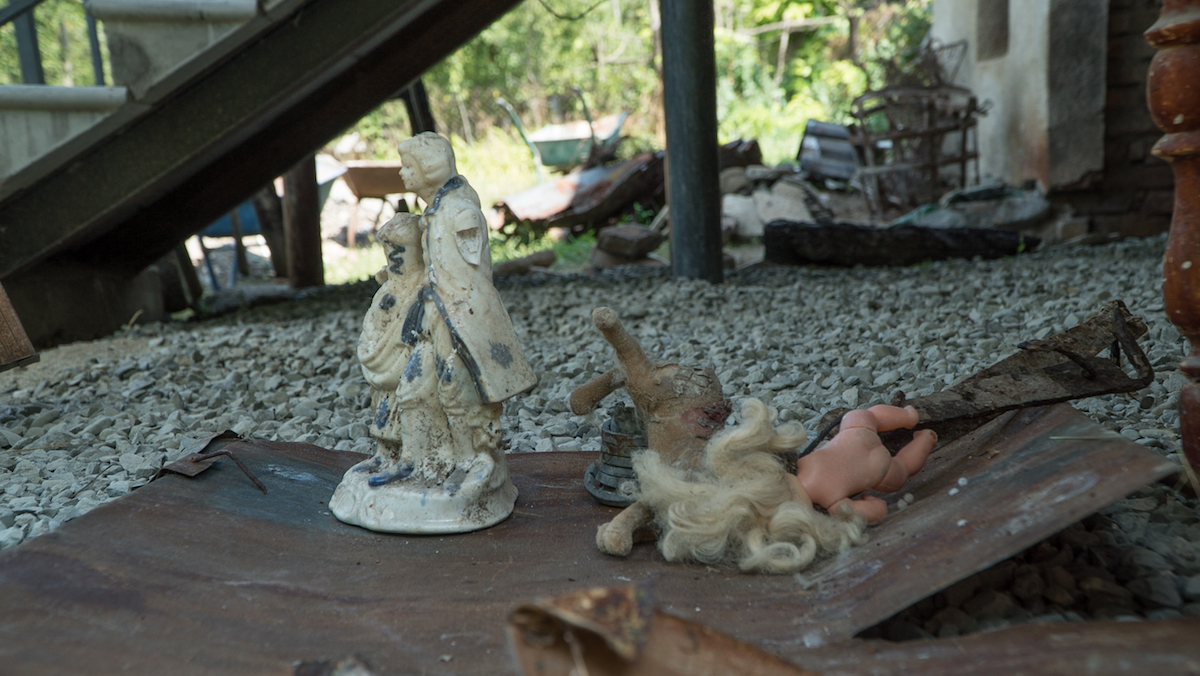
Vitali Kasradze says that in Ergneti in 2008, Ossetians burnt down homes. They call them here ‘self-defense’ or ‘volunteers’. Sometimes they say that the homes of the Georgians were destroyed by ‘Caucasians’, and thereby don’t ascribe a nationality to the attackers.
The Russian army, as many remember, did not participate in this. At the same time, their soldiers did not prevent such things from happening, including the burning of homes and marauding.
“In Ergneti, 80% of the houses were destroyed in 1991 when the conflict happened; the Georgians destroyed some of their houses, and the Ossetians responded in kind in 2008,” says Kasradze.
Does he believe that the monthly meetings of the Georgian, South Ossetian and Russian delegations through the intermediary of the European Union Monitoring Mission at the checkpoint in Ergneti can change the situation or solve concrete issues? For example, the issue of crossing the administrative boundary line?
“These meetings with the Ossetians won’t result in anything. There is a category of people both here and there who just refuse to find a way to communicate. And these channels of communication won’t be opened or found until they will be led by smart and intelligent people. There aren’t any such people now. They are doing the opposite. Those that sit up top, well, they want war. They earn well. What’s going on in your country [Ukraine] and what’s happening here… well, there’s no difference,” says Kasradze, glancing at the outlines of Tskhinvali.
In the EU Monitoring Mission office in Gori, one can see a long line of painted European emblems and flags. Will they really be needed? The mandate of the mission is limited to monitoring the situation along the line of contact from the Georgian side. They are not allowed on the Russian-Ossetian side.
State Border
Nine years ago, before the war, the administrative boundary line between South Ossetia and the rest of Georgia was crossable by both Georgians and Ossetians in order to go to the market or to visit the graves of one’s parents. Now along this line, the Russians have erected green and white signs with the inscription ‘State Border’ and ‘South Ossetia’. These lines are more reminiscent of an enormous ghetto, and the contours are seemingly arbitrary – the barbed wire lies where the Russians and Ossetians decided it should.
In the Georgian village of Khurvaleti, they extended the barbed wire so far that the courtyard of 83-year-old Dato Vanishvili ended up in occupied Russian territory, and the rest of the village in Georgia. In Soviet times, this village was a part of the Gori municipality of Georgia – not the South Ossetian autonomous oblast (region).
Georgian Ossetian Dato Vanishvili refused to move there. Together with his wife Valentina and his grandson Malkhaz he now lives just next to the barbed wire.
“They [the Russians and Ossetians] told me: either come over to our side, or move away from here. Where am I gonna go? I’ve been living here for 80 years,” he says.
On principle he refuses to use the Russian rouble – he receives his Georgian pension in lari and emphasizes that he is not afraid of the Russian border guards. Recently, a number of delegates and other representative of international organizations have come to greet him from across the line. Ukrainian President Petr Poroshenko was there in July of 2017. After the speech of the Ukrainian head of state, Malkhaz Vanishvili says he is sure the barbed wire will soon be removed.
On the day that we went to meet Dato, he was greeting a Moldovan government delegation. The Molodvans promised to bring a laptop computer for his son the next time they came around.
Local residents say that after such visits to Vanishvili’s family, the Russian border guards come for ‘preventative talks’. He doesn’t see any problem in this himself. He has a headache for other reasons – how to find a son for his 28-year-old Malkhaz. He asks the police and visitors to help him with this.
His grandson doesn’t plan to move further away from the barbed wire and Russian border guards either. He says he’ll continue to live just where he is now.
Another problem of Dato’s is how to get his wife to the hospital. The Ossetian doctors offered to treat her in Akhalgori.
“How will I get her there? I don’t know anyone there. We don’t have anyone there,” he says.
Valentina Vanishvili was also visited by Georgian doctors. They examined her over the barbed wire and said that they needed to take her to Gori or to Tbilisi. However, the authorities in South Ossetia did not grant them permission. As a result, Valentina Vanishvili has remained without the help of doctors.
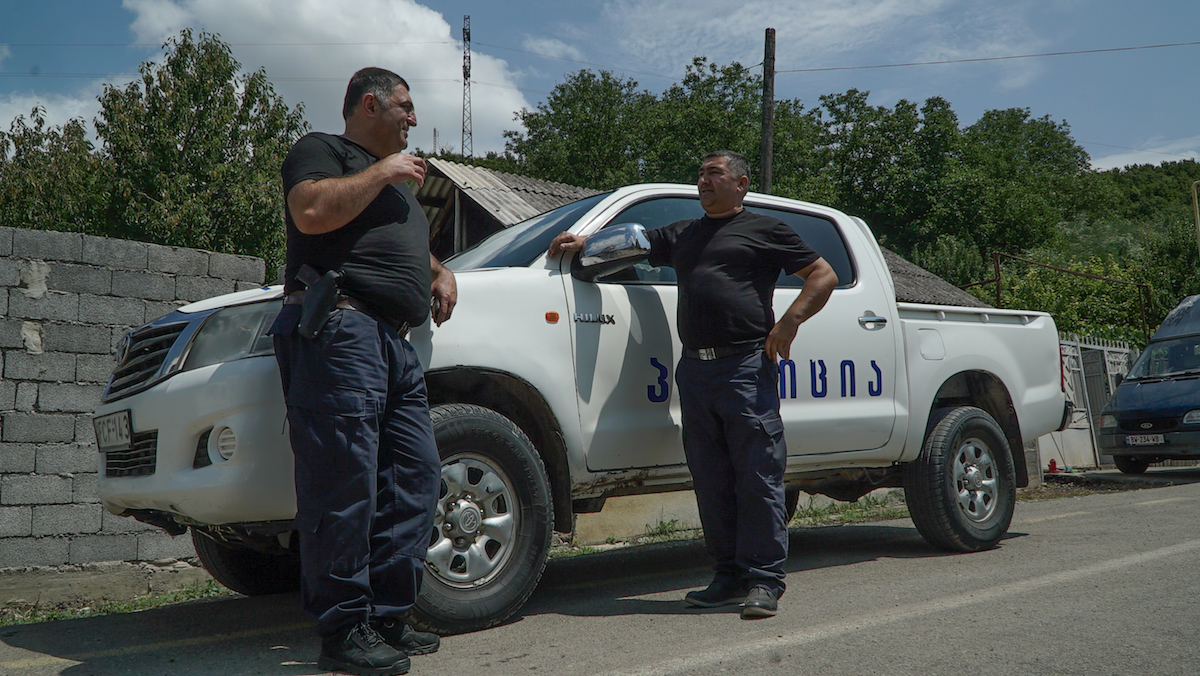
When asked what kind of help she needed, she answered ‘food and products’. Georgian policemen who patrol the line of contact from the Georgian side bring her bread.
A man with two houses on the ‘border’
Khurvaleti is not the only Georgian village where barbed wire has been laid out and in the process cut people’s lives in two. Another example is the village of Dvani of the Kareli region.
Three years ago, the Russian-Ossetian side stated that it intended to carry the line of demarcation some 50 meters deeper into Georgian territory. Georgia reports that the creeping occupation extended a few hundred meters into Georgian territory.
The house of Merab Mekarishvili in Dvani ended up within the zone of those 50 meters. When he found out about this, four days before the intended operation, he brought all his things and construction materials some 120 meters away from the line, and he started to build a new home.
Now he had two homes along the line of demarcation: one old one, ruined in the 2008 war and later repaired, and a new one, which is now being built.
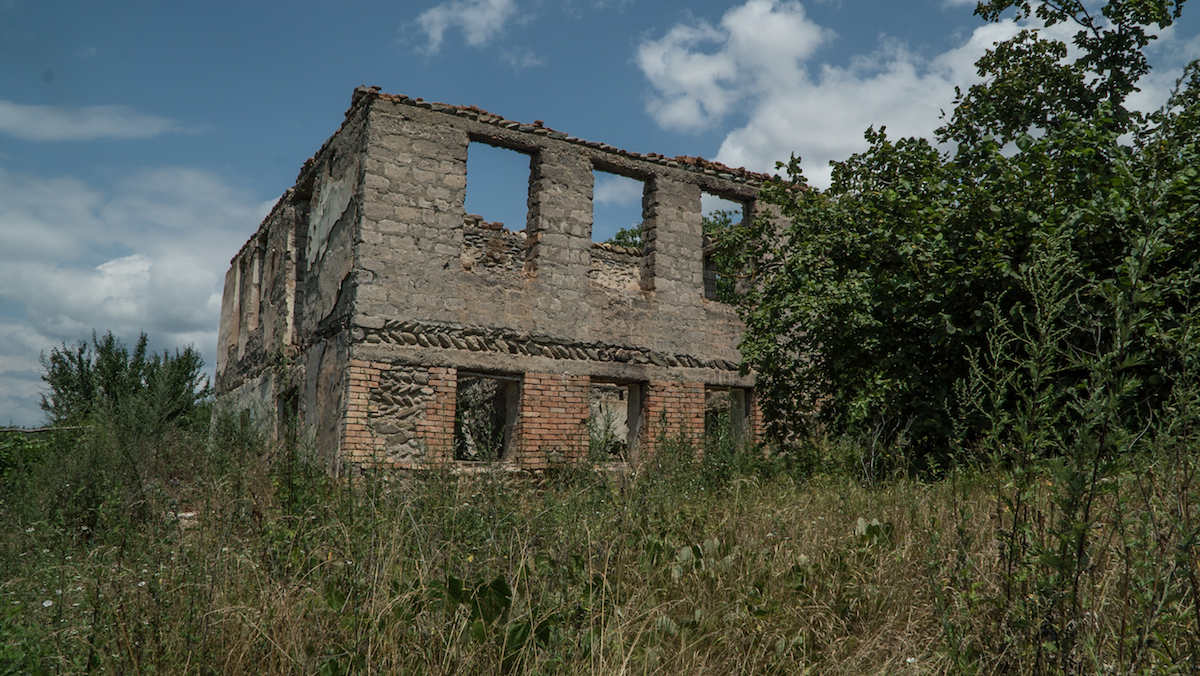
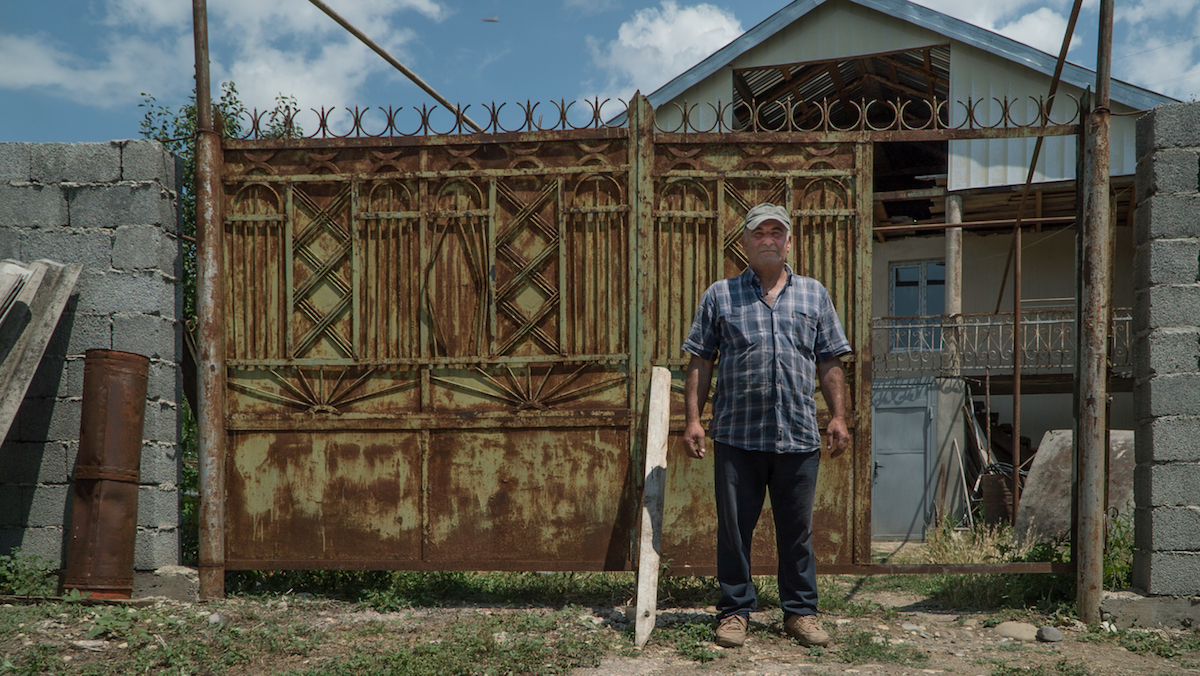
Now Merab Mekarishvili’s neighbors are Russian border guards. He can say hello to them from his very garden. They still haven’t pushed the barbed wire forward, but Mekarishvili is sure that this could happen any day, at any moment.
The geopolitical crawling occupation may continue, and that means that with time Russians may want to bring their forces another 50-100 meters into Georgia, in which case his home would end up outside of the territory controlled by the Georgian authorities.
In answer to the question of whether he is afraid that this will happen, he says: “No, at least not yet. We’ll see what happens. Georgia will of course not agree to this. This is our territory. But what can you do? They have power, and tanks.”
The Russian border guards neighbor Mekarishvili on two sides.
Their bunker sits on top of a hill, where his garden is, and also next to a few old and new houses.
Below the hill, at the end of the street, where the former and future house lies, the road is divided by a stone lump – one of the markers of the line of demarcation. Beyond it lies South Ossetian territory.
The man says that the Russian forces often hide there, and he often sees them in that spot.
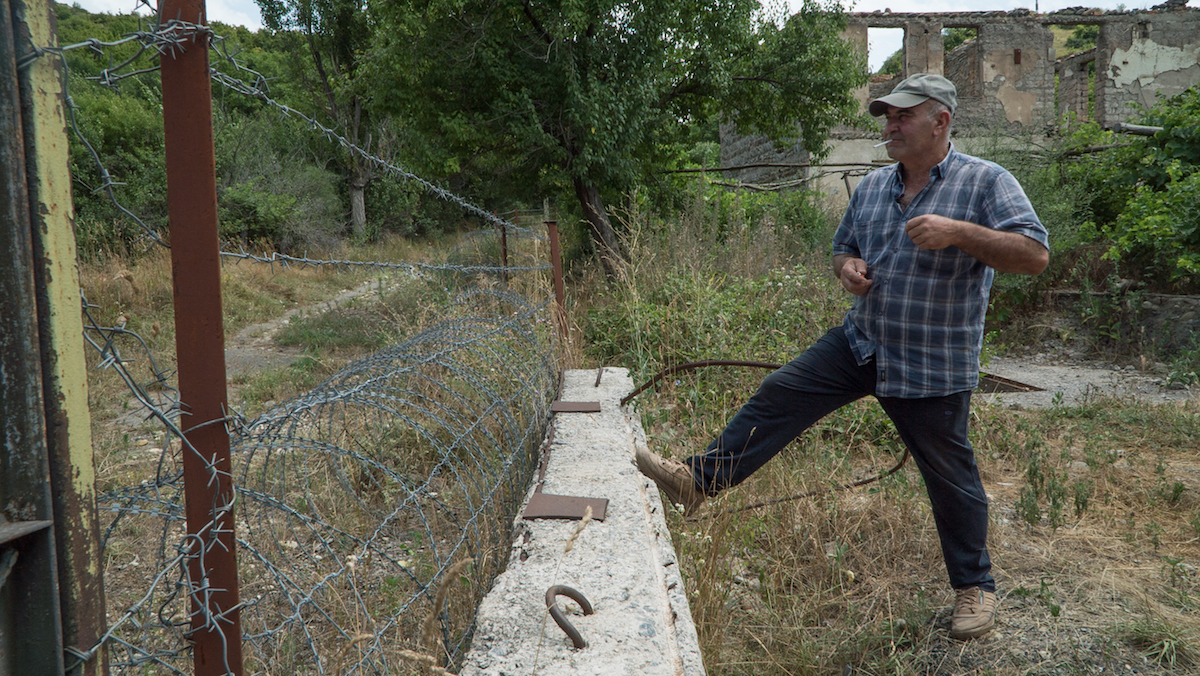
We go with him to the center of the garden. From there, one can easily see the Russian forces.
“Up until this point, it’s our territory. And that over there is already theirs,” shows Merab.
“That is to say, the apple trees are still yours?” we ask Merab.
“No, half of them will be theirs, half of them mine.”
“And this pear tree? That will be on their territory?”
“No, I’ll cut those trees down. You think I’ll let them have them?” answers the master of the garden.
Everyday he sees his old house – and every day he fixes or adds something to his new one. He says that he does not mourn what he has lost. He had never planned on leaving to make a new house in the depths of Dvani, further from the Russian border guards. His two daughters now live in Tbilisi.
“I was the first in Dvani from the Ossetian side. And now I will be the last. Where am I supposed to go? If everyone leaves, who will remain? No one. I will go, then my neighbor, then my friend will leave here as well. Without weapons in hand I’ll stay, but I will stand strong.”
During the war, more than 40 homes were burnt and destroyed in Dvani. In Ergneti, that number reached 160. Now in these villages you can see many of these abandoned homes.
But many of them have also been rebuilt: brick and slate were bought with the help of State and international donor organizations. For example, Lia Chilachidze’s house was rebuilt with construction materials bought with money donated by Denmark.
Merab Mekarishvili was helped by the State and co-inhabitants of the village. Those who lost their homes without the possibility of rebuilding them – that is, those whose homes are now on occupied territory – have several options for receiving new accommodation.
One can receive either an apartment in a new high rise from the government, or privatized temporary housing received in exchange after the war.
For example, in Gori, three kindergartens were turned into private housing for refugees from South Ossetia. People turned this former school into apartments. Lia Chilachidze helped families who live within the walls of these former kindergartens to register their documents in order to privatize these makeshift homes.
It is mostly large families with many children that receive apartments from the State, in addition to veterans of the war and the socially vulnerable.
Around Gori, one can see a number of cottages that look alike – they were put up with the help of international donors immediately after the war. These temporary houses soon turned into permanent housing for many people.
Many – for example, Vitali Kasradze, Lia Chilachidze, Dato Vanishvili or Merab Mekarishvili – chose a life practically on the line of demarcation, bordering and neighboring with Russian border guards, with views of Tskhinvali on the horizon and barbed wire all around and through their gardens and fields.
It’s a simple skip and a hop from their houses to Tskhinvali. There, in Tskhinvali, they have the graves of their parents, their friends, their memories of childhood and youth. Here, where they are now, are their native homes, kept and restored, despite the war and the new walls and barbed wire that have been erected.
“In Georgia, there was no better city than Tskhinvali. Quiet, calm. And what now?” says Kasradze. The Gori-Ergneti bus turned around on the road towards Tskhinvali and set off back for the Georgian town of Gori.
Toponyms and terminology used by the author, as well as views, opinions and strategies expressed by them are theirs alone and do not necessarily reflect the views and opinions of JAMnews or any employees thereof. JAMnews reserves the right to delete comments it considers to be offensive, inflammatory, threatening or otherwise unacceptable










